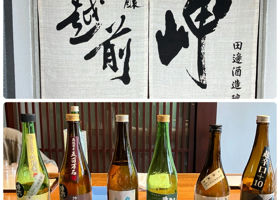Echizenmisaki特別純米酒「五百万石」 火入れ瓶囲い



ひるぺこ
This time it is Echizen-misaki.
We visited the brewery because we stayed at Cape Echizen during our summer vacation in Reinokita, Fukui.
The brewery staff had just left and we were greeted by the father, mother, and dog, Choco, who gave us a variety of tastings.
This time we decided to take home two bottles of 🟣Gohyakumangoku and 🟡Kuzuryu with different rice 😊.
By the way, the brewery is near Eiheiji, not Cape Echizen😅.
I'll start with the Gohyakumangoku.
It is served at room temperature.
It has a slightly greenish appearance, and the top aroma is a calm banana with a hint of blue melon. It also has a freshly pounded rice cake and a little bit of green bamboo.
It has a smooth mouthfeel. The nose is full of banana aroma, and the taste is crisp with a soft acidity and mild bitterness with a moderate umami of the rice.
When heated up, the banana aroma subsides, and the soft acidity and the enhanced rice flavor can be enjoyed lightly, making this lightly heated sake one that can be drunk endlessly 😆.
The mainstay of Fukui sake is Gohyakumangoku produced in Fukui.
Ihyakumangoku tends to be a rather plain sake, but each brewery has its own originality and the unique flavor of Ihyakumangoku is good and never tiresome to drink. This was a sake trip that reminded me once again that Ihyakumangoku is also good.
Next time, we will go to the Kuzuryu version.
Japanese>English
ワカ太
Good morning, Hirupeko 😃I saw both of your Echizenmisaki drinking comparisons and both look so delicious 😋I was especially interested in the heated finish of both 😆 It was so easy to understand the differences in sake rice because it was carefully written.
Japanese>English
ひるぺこ
Hi, Wakata-san. I visited the brewery with the intention of drinking Kuzuryu, but after tasting the sake, I couldn't resist the Gohyakumangoku and compared them 😊Cold sake is good, but heated sake is also delicious.
Japanese>English